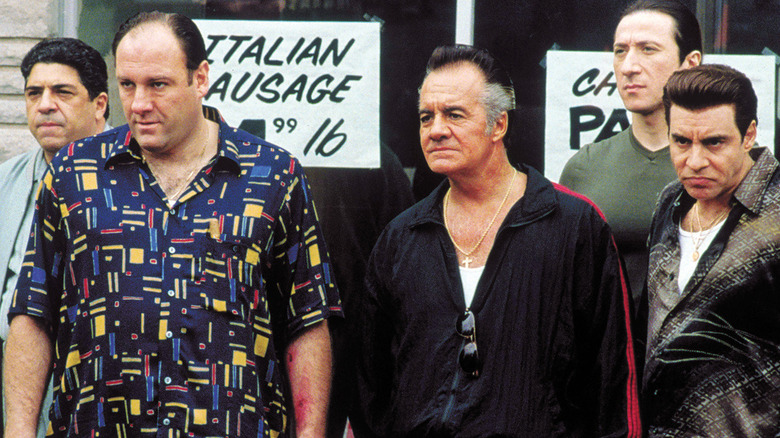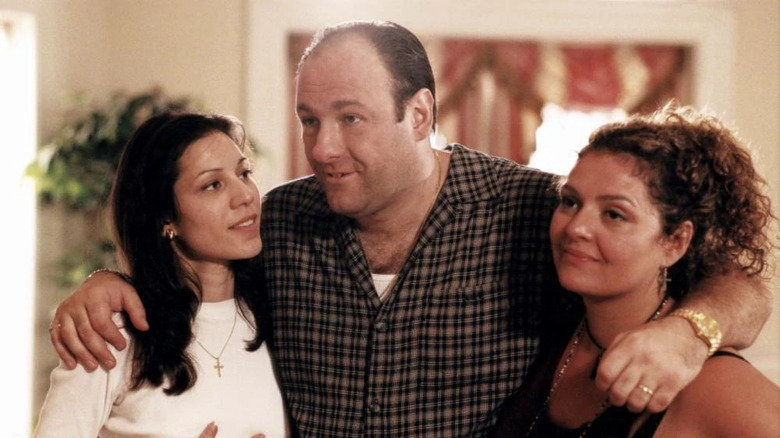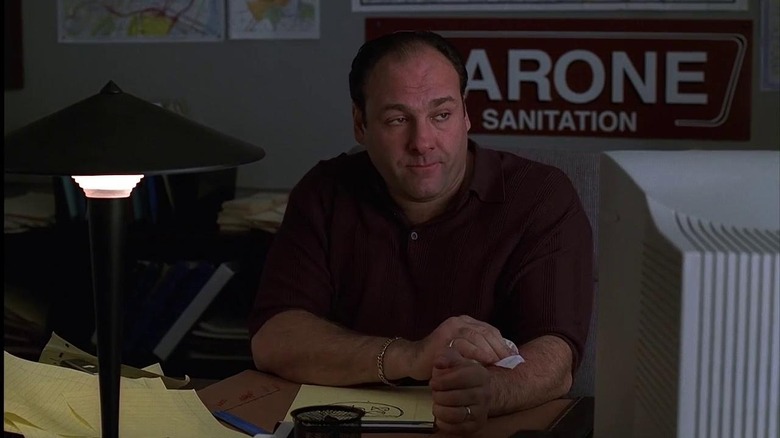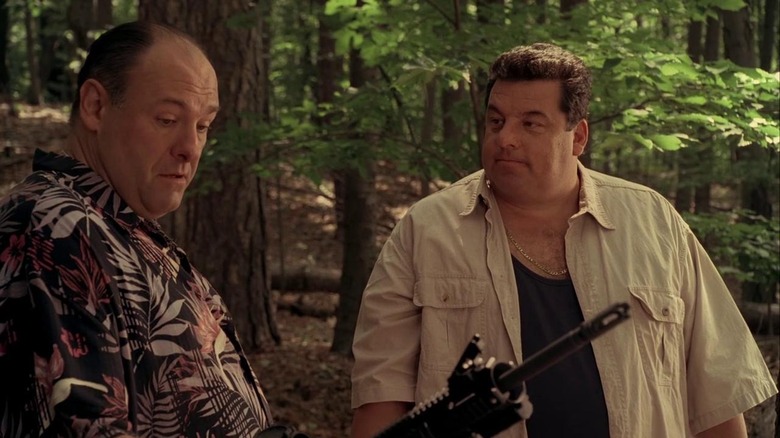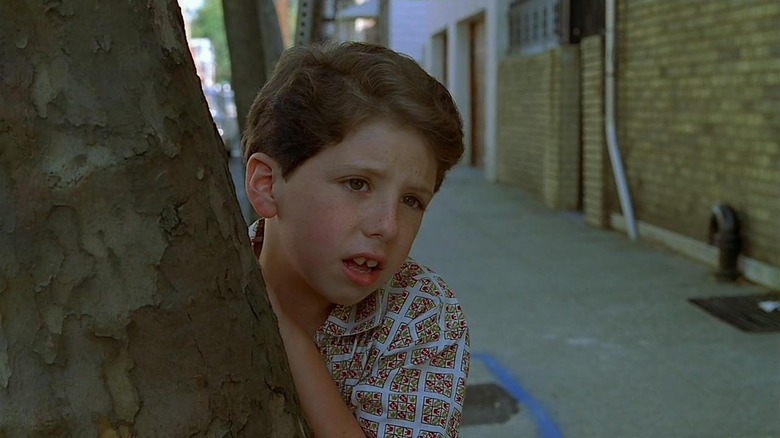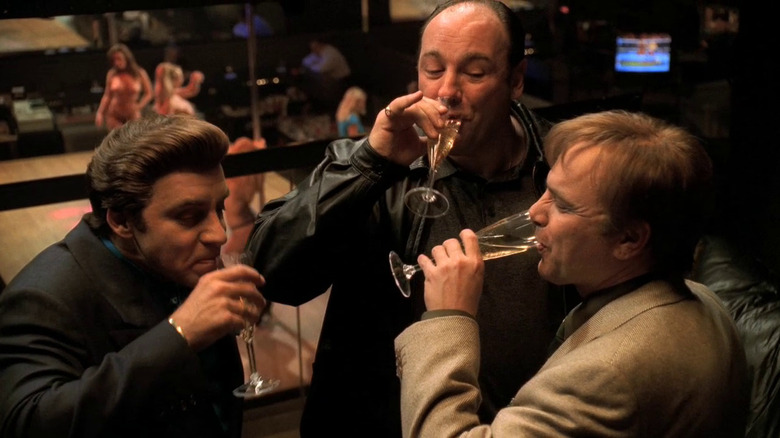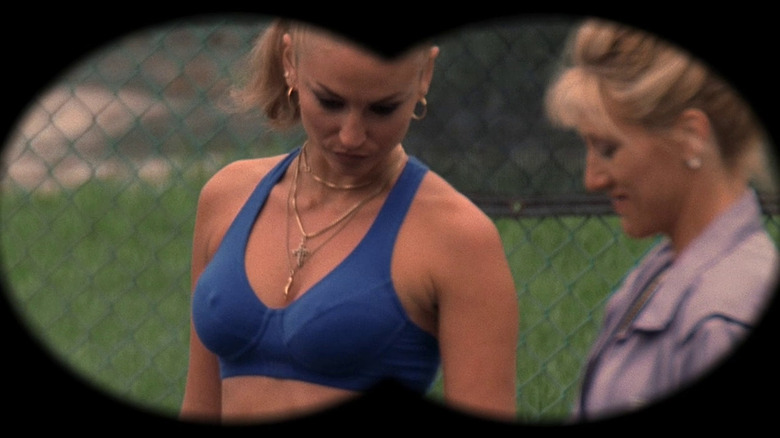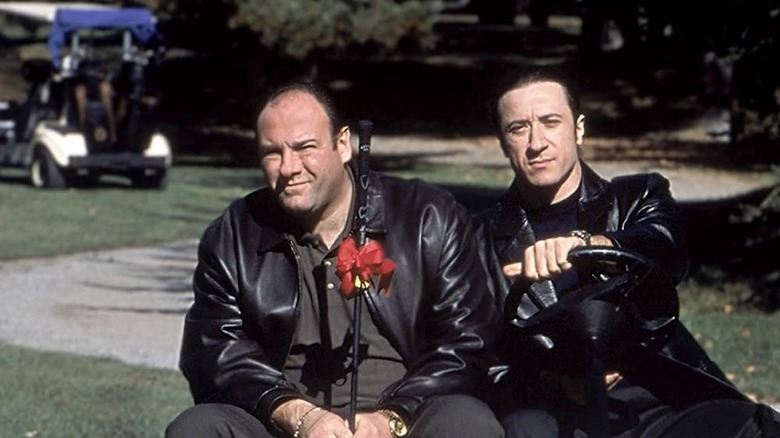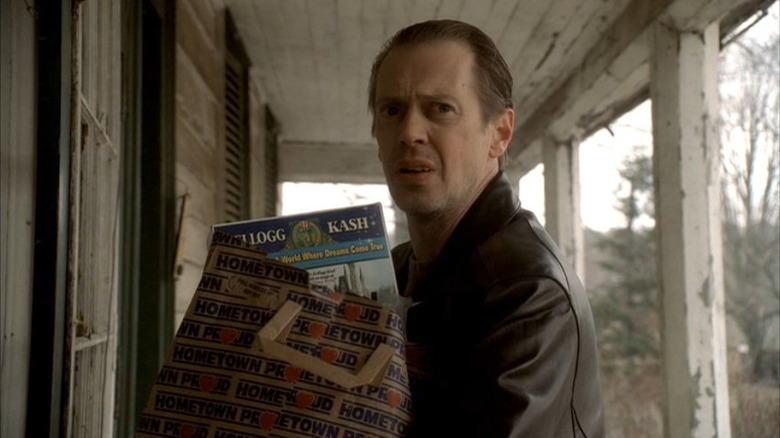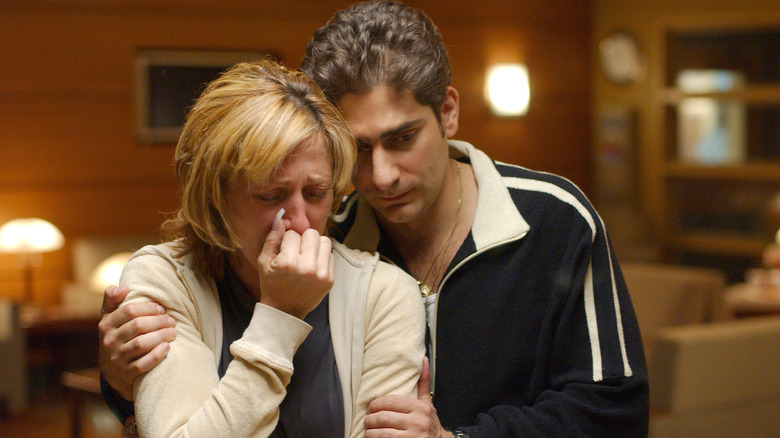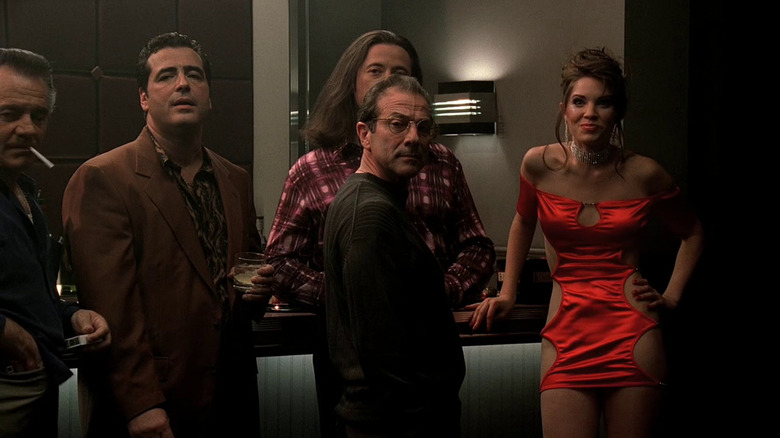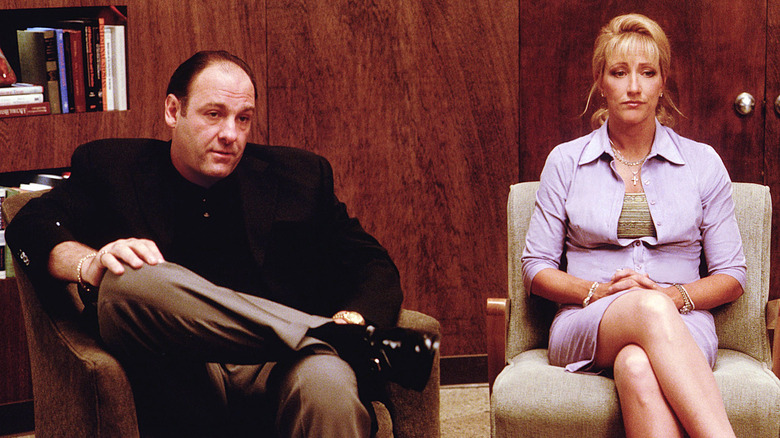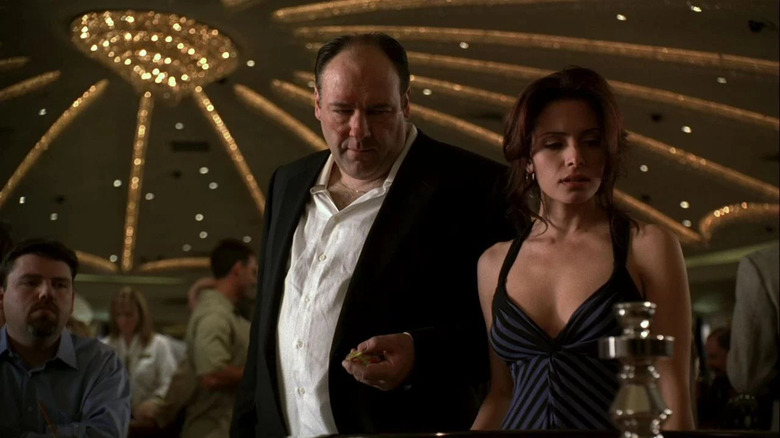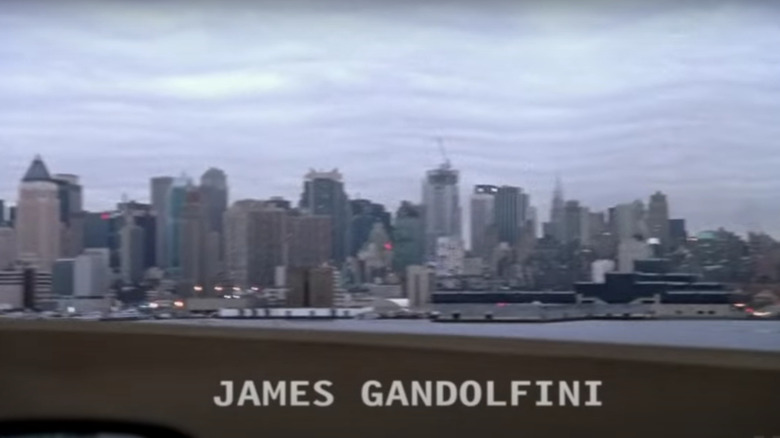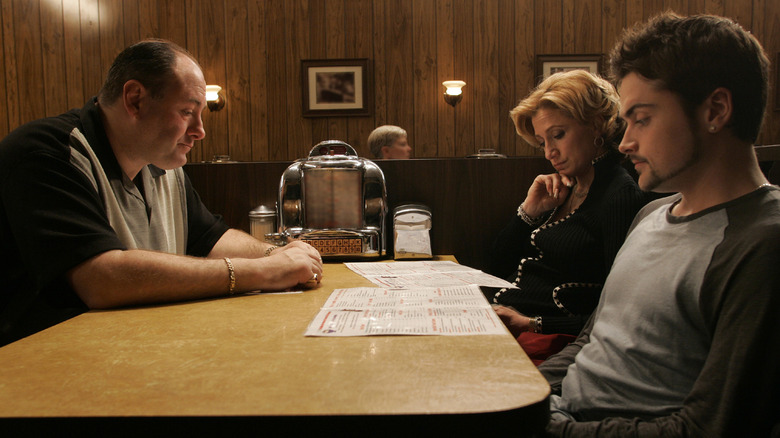Don't Stop Believin': The Best Music Moments In The Sopranos
"The Sopranos" is known for its diverse soundtrack that series creator David Chase, producer Martin Bruestle, and music editor Kathryn Dayak (and occasionally Steven Van Zandt, E Street Band member and Silvio Dante actor) carefully selected. Pre-recorded music is often chosen after completing the production and editing of an episode, but occasionally sequences are filmed to match the songs picked beforehand. In "The Sopranos: Selected Scripts from Three Seasons," Chase elaborates on why he uses popular songs and little to no original compositions:
"I sometimes see the music as another character, the lyrics of songs functioning as a Greek chorus, sometimes — but not always — summing up or commenting on events in the story ... Mostly the music fosters a feeling or mood."
Chase masterfully curates music from an assortment of moods, genres, and artists to voice the inner emotional life of his characters and their relationship to contemporary culture. This sonic tapestry amplifies the story being told and the themes of suburban family life, modern psychotherapy, masculinity, the traditions of the Italian-American mafia, and more. The predominant use of rock and roll music reflects both the ensemble's baby boomer tastes and the series' New Jersey locale which was home to a unique rock club scene down the shore. Chase uses music to create striking moments where the song meets the image in the most perfect way. Here are some of the best examples.
14. 'It Was a Very Good Year' in 'Guy Walks Into a Psychiatrist's Office...,' Season 2, Episode 1
No other singer (besides Bruce Springsteen, who appears later in this list) epitomizes New Jersey as much as Frank Sinatra. Sinatra's intoxicating croon in the dreamy, nostalgic ballad "It Was a Very Good Year" underscores the characters' past year in a montage during the first episode of season 2: Tony counts money and has relations with his mistress before crawling in bed next to Carmela, Paulie has intercourse in the back room of the Bada Bing, Livia does physical therapy in the hospital, Christopher snorts cocaine, Uncle Junior walks alongside his fellow cellmates, Meadow learns to drive, A.J. gets ready for school, and so on. The lush strings and pensive lyrics are well-suited to this leisurely and elegant re-introduction of the main characters.
David Chase uses the song to mark where the characters have been the past year and where they might be going (via Vice):
"The whole show was about aging, time and mortality. And that was one of the first instances of presenting that theme musically. That's why we had people by themselves looking in mirrors off into space. They're reflecting. 'It Was a Very Good Year' was the one time in which we used music to comment on ... the fact that the show had been so successful. That was part of the joke: season one had been 'a very good year.'"
This self-referential sequence marks one of the most memorable season premieres in the series.
13. 'You Can't Put Your Arms Around a Memory' in 'House Arrest,' Season 2 Episode 11
Johnny Thunder's snarling punk anthem "You Can't Put Your Arms Around a Memory" starts to play when Tony and his crew are gathered outside of their old haunt, Satriale's pork store. The camera rises up towards the sky, looking down on the DiMeo family in judgment as Thunder growls his biting lyrics, cautioning them against romanticizing the past; "Don't try, don't try," Thunder spits out. Tony and his crew constantly long for the "good old days": when no one betrayed their oath and became a rat, when they did not face as much pressure from law enforcement, when Tony didn't have to waste his days at home or in the office of Barone Sanitation to stop the feds from sniffing around.
As Tony says in the series' first episode, "It's good to be in something from the ground floor. I came too late for that and I know. But lately, I'm getting the feeling that I came in at the end. The best is over." Their mafia brotherhood is defined by the rigid rules and traditions upheld by their fathers and the men before them. But Tony feels the best days of his family are waning, the days of formidable masculinity that the icon Gary Cooper exemplified. With its jagged guitars and sardonic lyrics, "You Can't Put Your Arms Around a Memory" counters Tony's nostalgia and warns him that it is futile to hold onto the past.
12. 'This Magic Moment' in 'Soprano Home Movies,' Season 6, Episode 13
Critics consider "Soprano Home Movies" one of the best episodes in the series. What begins as a tranquil family excursion at a lake house ends in a brawling fistfight between Tony and Bobby Bacala. During a game of Monopoly, Tony makes fun of Janice for giving sexual favors to men under the boardwalk during their youth; his cheeky humming of The Drifters' "Under the Boardwalk" sets off Bobby and he pummels his brother-in-law and boss. Tony vindictively retaliates by forcing Bobby to kill someone for the first time in his mafia career.
"This Magic Moment" plays in the episode's final scene, a pleasant tune that, on the surface, compliments the serene landscape of a golden sky and glistening lake where Janice and their friends drink wine while their children play. But when Bobby exits the car and hugs his child, there's a cold distance in his eyes that darkens this peaceful tableau of a perfect summer evening. The song's sweet, innocent sounds become unsettling.
The moment Bobby committed murder for the first time — staring deep into his victim's eyes as he pulled the trigger — was anything but magic and will haunt him forever. The sprightly strings, King's velvet voice, and lyrics about the starry-eyed wonder of a first kiss ironically betray Bobby's crestfallen face. It's a chilling way to cap off an episode.
11. 'White Rabbit' in 'Down Neck,' Season 1 Episode 7
One of the most notable songs filmmakers often use to signal the 1960s is Jefferson Airplane's "White Rabbit." The song precedes Tony's drug-addled flashback to his childhood in 1967, the same year the song was released. Grace Slick's uncanny voice against the intricate, sharp guitars and enigmatic lyrics that reference hallucinogens create a psychedelic sound that matches Tony's consumption of Prozac and hazy gaze into the mirror as he reflects on his complex childhood.
Much like Alice in Wonderland, Tony goes on a trippy journey filled with strange, terrifying creatures: his mother's pointed anger as she threatens to stick a fork in his eye, his father viciously beating a guy who owes him money. The pills make Tony feel small again, a young boy observing things he shouldn't and having disturbing interactions with the adults who should love and care for him.
Jefferson Airplane's surreal, wailing tune is the best choice to accompany Tony's mind-bending childhood memories and the last scene with AJ when they make sundaes. Tony does not want AJ to experience the same worrisome upbringing or inherit his depression and panic attacks. "White Rabbit" has a bizarre sound that supports the unsettling aura of this episode.
10. 'Oh, Girl' in 'Watching Too Much Television,' Season 4 Episode 7
What makes "The Sopranos" so fascinating is that it peeks into the daily life of someone whose occupation is defined by brutal violence. At the same time, we see Tony Soprano rocking out to the radio just like any normal guy. He sings along to "You Ain't Seen Nothing Yet" by Bachman-Turner Overdrive but when the Chi-Lite's sorrowful "Oh, Girl" takes over the airwaves, Tony is overcome with emotion. He identifies with the ballad's heartbroken protagonist: a helpless man who doesn't know where he can find love. As Eugene Record's mournful voice soars and the harmonica warbles, Tony fights back tears and reflects on his former goomar Irina who is now in a relationship with one of his business partners, Congressman Ronald Zellman.
Chase spoke on the scene and music choice in The Star-Ledger:
"Certain people who really run from their emotions are very sentimental. It's hard for them to acknowledge true emotions, but they wallow in sentimentality. And that kind of a song, if you're driving along, late at night and that song comes on, it gets you."
The song highlight's Tony's duality: one minute he can be weeping to a love song and the next he is beating Zellman with a belt. The amorous song ironically continues over this swift scene of violence and into the credits, acknowledging the emotional vulnerability that Tony is capable of beneath his brutish exterior.
9. 'Peter Gunn/Every Breath You Take' in 'Mr. Ruggerio's Neighborhood' in Season 3, Episode 1
One of the boldest uses of music in "The Sopranos" is a mashup of The Police's "Every Breath You Take" and the theme song from the 1960s spy series "Peter Gunn." The combination of these two propulsive songs (which nearly sound identical) fuels the montage of the FBI watching every move the Sopranos family makes from afar — through binoculars, behind bushes, in a secret van. Henry Mancini's big, brassy orchestrations interwoven with The Police's hypnotic bass line adds a theatrical sense of adventure to what is typically a gritty, realistic drama.
The entire episode "Mr. Ruggerio's Neighborhood" stands out for being from the feds' perspective and the soundtrack mirrors their obsessive voyeurism. In an interview with Independent, Sting commented on his inspirations for what is often mistaken for a love song: "I was thinking of Big Brother, surveillance and control," making it the perfect fit, along with Peter Gunn's brazen strings, for the FBI's desperate attempt to find evidence and build a case against Tony.
8. 'Black Books' in 'Second Opinion,' Season 3, Episode 7
In "Second Opinions," Nils Lofgren's (another member of the E Street Band) delicate ballad "Black Books" underpins Carmela's identity crisis. At the recommendation of Dr. Melfi, Carmela sees a therapist who advises her that Tony cannot be redeemed and she is his enabler/accomplice living off of his blood money. This upbraiding also incites Carmela's fears of sin and eternal damnation. However, she finds it hard to resist the allures of wealth — her mansion, fur coats, sparkling jewelry. She wants to add some legitimacy to the Soprano name by having Tony donate $50,000 for a new building at Columbia.
Lofgren's light, wistful singing voice, and ethereal instrumentations embody Carmela's black mood. As in the melancholy lyrics about a lover who has moved on and is searching for someone else, Carmela wonders what another life would be like if she was capable of leaving Tony. Could she find a "new shoulder to cry on?" Could she "get lost in other eyes?" When Tony finds Carmela lying in a blanket on the couch, he tenderly offers the money for Columbia and says she could use a night off from cooking. The somber, atmospheric tune continues with Lofgren's intense guitar plucking as they slowly trudge up the stairs, Carmela's unhappiness fraying their already dubious relationship.
7. 'Glad Tidings' in 'All Due Respect,' Season 5 Episode 13
"Glad Tidings" is heard numerous times in the season 5 finale but the most noteworthy instance is during Tony Blundetto's death. In spite of its bouncy beat, sassy saxophone, and Van Morrison's ebullient vocals, the song foreshadows Tony's demise. The opening image of Tony driving through the cornfields to hide at the family farm is reminiscent of the "Leave the gun, take the cannoli" scene in "The Godfather," a bucolic setting that hides something sinister. The first line of the peppy farewell song is "And they'll lay you down, low and easy," which may not make total sense for being shotgunned in the face, but at least it's quick.
Morrison's sunny tune continues as Tony walks up onto the porch with his groceries and fades right before he sees Tony Soprano with the gun. "Glad tidings from New York" is the last line heard before Tony Soprano appears, distinctly marking the act as a way for the crime boss to save his cousin from Phil Leotardo's torture while staying in the city leader's good graces. It's cheeky and clever, demonstrating David Chase's meticulous attention to detail in the lyrics and how they mirror what occurs on screen.
6. 'When It's Cold I'd Like to Die' in 'Join the Club,' Season 6 Episode 2
Moby's ghostly composition "When It's Cold I'd Like to Die" carries one of the most moving episode endings in the series. After Tony gets accidentally shot by Uncle Junior, he is on the precipice of death — a constant threat for all of the characters in this series. We are immersed in Tony's coma-induced hallucinations with no clear idea of when they might end or if he will recover.
As Tony floats in his unconsciousness, one step away from "joining the club" of the dead, he contemplates his identity, imagining the normal suburban life he never got to have. What would it be like if he lived on the straight and narrow? Would he be a faithful, happily-married salesman who worked for the government? (Perhaps the strangest thing about this sequence is James Gandolfini's lack of New Jersey accent.)
In the dream, he is brought to the emergency room and told that he is in the early stages of Alzheimer's disease. When the doctor leaves, Tony mutters "I'm lost." After he returns to his hotel room, Tony stares at a beacon of light outside his window. Coming out of the darkness like a bottomless, black ocean, Moby's swirling electronic strings and Mimi Goese's haunting vocals overpower the shot. The elegiac synth ballad has an epic feeling that truly harnesses that sense of life hanging in the balance. The lyrics speak to Tony's current situation on the other side, trapped in the fog of purgatory. "If I holler let me go," Goese trembles in her naked, aching voice and we feel just as lost as Tony.
5. 'Living on a Thin Line' in 'University,' Season 3 Episode 6
The heavy bassline of The Kinks' "Living on a Thin Line" is used multiple times throughout the episode "University" during scenes at the Bada Bing. Hardly appropriate stripper music, the mesmeric rock tune is about the deterioration of national identity at the end of the 20th century and longing for a return to the "days of old," one of the key themes in "The Sopranos." "I've got more e-mails and questions from friends about what that song was than anything else we've used in the show's history," writer-producer Terence Winter told The Star-Ledger.
The song has a brooding quality that serves well as a lament for the tragic character Tracee who meets an untimely end from the cunning and sadistic Ralph Cifaretto. All of the characters, not only Tracee, are living on a thin line — one step away from murder, jail, or committing a crime that will haunt them for the rest of their lives. The somber "Living on a Thin Line" leaves such a strong impression because it mourns a romanticized past and ponders where to go next.
4. 'State Trooper' in 'I Dream of Jeannie Cusamano,' Season 1, 13
Just like Bruce Springsteen's "State Trooper" narrator makes his way down the New Jersey turnpike on a cold, wet night, Tony and his family weather a storm to enjoy each other's company at Vesuvio. The chugging guitar strums in the song's opening are stark and foreboding, penetrating the episode's final image of domestic comfort as the Sopranos share a warm meal and "enjoy the little moments that were good" in the soft candlelight.
Springsteen sings of the same refineries that Tony passes every episode in the opening credits while the rest of the sinister song connects to Tony's psychological conflicts. "State Trooper" similarly focuses on a morally ambiguous protagonist who drives further and further into the recesses of the road and his mind; "Deliver me from nowhere," he cries — a metaphor for the bottomless, black emptiness of depression. Springsteen's agitated criminal has been bothered by something his whole life, just as Tony's childhood still torments him.
By situating the ominous dirge at the end of Season One, the song precipitates Tony's constant, gnawing paranoia throughout the series that the law enforcement will catch up with him. Recorded on a 4-track tape deck, the sparse instrumentation and Springsteen's spooky voice makes a gripping conclusion to the first season that leaves the audience wondering what kind of road lies ahead for Tony Soprano.
3. 'Comfortably Numb' in 'Kennedy and Heidi,' Season 6, Episode 18
Driving Tony back home from a meeting in New York, Christopher blasts "Comfortably Numb" from "The Departed" soundtrack in his fancy car stereo, the live version performed by Pink Floyd's Roger Waters, Van Morrison, and The Band. High as a kite despite numerous attempts at sobriety, Christopher lets the epic sounds and spacey lyrics wash over him. He clearly identifies with the lead singer's infatuation with drugs — the feeling of relief they bring and finally being so disconnected from reality. Tony sadly takes in Christopher's inebriated face while Waters sings, "The child is grown, the dream is gone," expressing Tony's disappointment that his nephew is not a worthy successor.
The solemn song continues while Christopher grows more restless, reaching the end of the verse just as Christopher swerves into the next lane and veers off into a ditch. The grand synth coda gives way to the sound of crushing metal when the car flips over again and again. When Tony emerges from the car relatively unscathed, he sees that Christopher is barely conscious and bleeding from the mouth. "Comfortably Numb" articulates Tony's peace of mind after he quickly decides to kill Christopher by suffocation; he is relieved to be rid of his troublesome nephew who was far too dependent on chasing that numb feeling through drugs and alcohol.
2. 'Woke Up This Morning (Chosen One Mix)' in every episode
A British band playing a medley of American country, blues, and techno seems the most unlikely choice for the opening of "The Sopranos" in all 86 episodes, but David Chase was intrigued by this mix of new and old sounds. "Earlier we had thought of having revolving main title songs with the concept of every song from Tony's car radio," but HBO insisted on a consistent theme producer Martin Bruestle told the writer of "Hollywood Shack Job: Rock Music in Film and on Your Screen." After some contemplation (Elvis Costello's "Complicated Shadows" was almost the winner), A3's "Woke Up This Morning" was chosen.
The song's iconography fits Tony's life: as the Chosen One set to lead his mob family, every morning he wakes up and lives under the rule of the gun. The idea of being "born under a bad sign" is explored throughout the series as Tony contemplates his predispositions to mental illness and what led him to follow in his father's footsteps and become a mafioso. A3's rumbling bass line, trilling synthesizer effects, and booming lead vocals lend a braggadocio feeling to the song that propels Tony forward as he travels from the city, through the Lincoln Tunnel, down the turnpike past ramshackle houses to his stately mansion. This oddball soundtrack, as opposed to a rock and roll tune from the 1960s or something Italian, is what initially marks "The Sopranos" as a unique gangster study in a new era.
1. 'Don't Stop Believin'' in 'Made in America,' Season 6, Episode 21
Journey's "Don't Stop Believin'" is a bemusing choice for the final scene. It's an uplifting song about surviving against the odds of which are not in Tony's favor as his crew is being hunted or he could be going to jail. Steve Perry gave David Chase permission to use the track only three days before the episode aired, fearing that it would accompany a gruesome death scene, but the ending is notoriously left ambiguous.
Chase brilliantly choreographs the editing to the song's upbeat rhythms, heightening the tension as we reach the conclusion. During the crescendo of soaring guitars and wailing vocals, Chase cross-cuts between a suspicious-looking man and Meadow's inability to parallel park. In the final shot, Tony looks up at the front door but the reverse shot from his POV suddenly smashes to black, interrupting the power anthem mid-sentence, "Don't stop —." Is it the sudden darkness of death that Tony sees? Chase remains secretive about Tony's fate, even to this day (via Vulture):
"There was something else I was saying that was more important than whether Tony Soprano lived or died. About the fragility of all of it. The whole show had been about time in a way, and the time allotted on this Earth ... All I wanted to do was present the idea of how short life is and how precious it is."
Tony's life will go on and on and on without him, into the next generation and the next, whether he dies at the diner or some other time. For now, "The Sopranos" leaves his story on a bold note, Journey's over-the-top, inspirational anthem giving Tony a small moment of triumph where he is content with his family.
